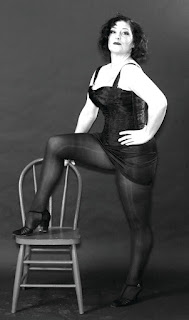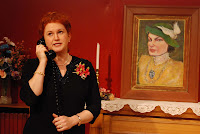 |
Photo by Craig Mitchelldyer
Pictured from left are Norman Wilson, James Langston Drake, Louise Stinson, and Adam Davis
|
With its vibrant production of “The Andrews Brothers,”
Broadway Rose Theatre Company brings two hours of non-stop ‘40s-style musical
entertainment to Tigard’s New Stage Theatre. The company, from start to finish,
draws everyone into the production – first by honoring any WWII veterans in the
audience, next by recognizing all veterans present. Whether it was at Guam, Kyongson,
Da Nang, or Kabul, the United Service Organizations (U.S.O.) have been bringing
a slice of home to U.S. soldiers since 1941, and this show is an affectionate
tribute to the U.S.O.’s many years of service.
The set-up is simple – the Andrews Sisters have a show at a military base in the South Pacific for a group of soldiers going off to battle the next day. Three stage-hands, brothers who are frustrated entertainers, have developed a repertoire of musical numbers that they can never hope to perform on stage. When pin-up gal Peggy Jones (Louise Stinson), the warm-up act, arrives the stagehands pretend to be back-up singers and the foursome rehearses a series of WWII-era classics. Word comes in that the Andrews Sisters have been quarantined and the show is to be cancelled. In the best musical-comedy tradition, of course the show must go on. Unwilling to disappoint the troops (and eager to showcase their talents), Act I closes as Peggy talks the boys (conveniently named Patrick, Max, and Lawrence Andrews) into doing the show – in drag, as Patty, Maxene, and LaVerne. In Act II, the set is transformed into the actual U.S.O. show, and voila! The theater audience fills the role of the battle-bound troops.
Almost all of the show’s songs are ensemble numbers,
capitalizing on exceptional vocal harmonies while showcasing each performer’s
individual abilities. The near-flawless performances are as much a tribute to
Jeffrey Childs’ musical direction as they are a reflection of the cast’s
uniformly strong singing voices. The few
solo numbers belong to Stinson, who fluidly shifts from her girl-next-door
persona to sultry vamp depending on the demands of the song. Adam Elliot Davis
(“Max”), James Langston Drake (“Patrick”), and Norman Wilson (“Lawrence
Special recognition is due to pianist (and conductor, and
music director) Jeffrey Childs, bassist Jonathan Lakey, and drummer Rene Ormae
Jarmer, who carry the entire musical score of the production. The first-act set was simple, but amply
fulfilled its purpose to establish the foundation for Act II’s stunning
transformation into an “actual” U.S.O. stage.
Finally, kudos to director Dan Murphy, who clearly understands the music and mores of the show’s era and guides his talented cast and crew through the process of creating a magical escape for his audience.
“The Andrews Brothers”
runs through May 20 at the Broadway Rose New Stage in Tigard. Performances are
7:30 p.m. Thursdays – Saturdays, with 2:00 pm matinees on Saturdays and
Sundays.







